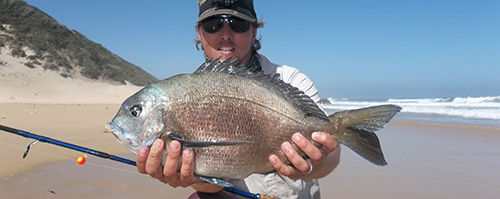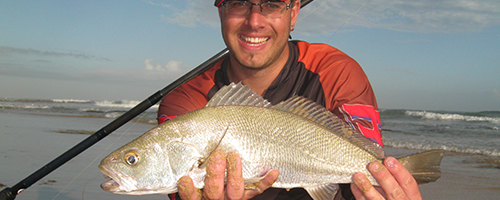Information & Photo's: South African Spot Damsel (Sergeant) Abudefduf sordidus - Damsel Fish
![]() The
Spot Damsel, also referred to as the Spot Sergeant is a
South African
fish species that belongs to the Damselfish group of fishes. The
Spot Damsel is a very distinct looking fish and therefore quite easy to
identify. South African Damselfish are small fish that are very common
on coral reefs and they lay eggs and can be omnivorous, herbivorous or
planktivores. The Spot Damsel occurs from the Transkei all the way up to
Kosi Bay and beyond in
South
African coastal waters.
The
Spot Damsel, also referred to as the Spot Sergeant is a
South African
fish species that belongs to the Damselfish group of fishes. The
Spot Damsel is a very distinct looking fish and therefore quite easy to
identify. South African Damselfish are small fish that are very common
on coral reefs and they lay eggs and can be omnivorous, herbivorous or
planktivores. The Spot Damsel occurs from the Transkei all the way up to
Kosi Bay and beyond in
South
African coastal waters.
 The
Spot Damsel (Spot Damselfish, Spot Sergeant, Abudefduf sordidus)
is a small oval fish that can attain 25 centimeters in length. It is
predominantly grey with a black spot close to the tail. The dead
specimens turn grey after a while. The Spot Damsel normally has 6 or 7
white vertical bars on their side and their fins can often appear to be
a yellow colour. The Spot Damsel occurs in rock pools, tidal pools,
gullies, inlets and shallow rock reefs in South Africa. Generally the
Spot Sergeant is omnivorous and very aggressive over the territories
they occur in.
The
Spot Damsel (Spot Damselfish, Spot Sergeant, Abudefduf sordidus)
is a small oval fish that can attain 25 centimeters in length. It is
predominantly grey with a black spot close to the tail. The dead
specimens turn grey after a while. The Spot Damsel normally has 6 or 7
white vertical bars on their side and their fins can often appear to be
a yellow colour. The Spot Damsel occurs in rock pools, tidal pools,
gullies, inlets and shallow rock reefs in South Africa. Generally the
Spot Sergeant is omnivorous and very aggressive over the territories
they occur in.
How To Catch South Africa's Spot Damsel Fish?
 The
Spot Damsel can be easily caught as they are so territorial, the problem
is trying to find them. They normally can be found in deep tidal and
rocky pools and a small piece of sardine, squid or pink prawn can tempt
the Spot Damsel into taking your
bait.
The best size hooks to use for the Spot Damsel would be anything from a
size 16 to a size 6, as they have very small mouths you will be lucky to
catch one of these fish on a hook bigger than that.
The
Spot Damsel can be easily caught as they are so territorial, the problem
is trying to find them. They normally can be found in deep tidal and
rocky pools and a small piece of sardine, squid or pink prawn can tempt
the Spot Damsel into taking your
bait.
The best size hooks to use for the Spot Damsel would be anything from a
size 16 to a size 6, as they have very small mouths you will be lucky to
catch one of these fish on a hook bigger than that.
Light tackle and light line will be the best way to target this fish and to have fun while catching them. A light 4-6 foot spinning rod with a small 1000-2000 size reel and 2 kilogram line. The Spot Damsel is a beautiful fish and really not worth eating so please return this fish species back to the water safely once you have caught it. Please see more photographs and images of the Spot Damsel below:
 |
 |
 |
 |
 |








